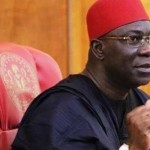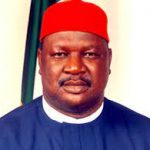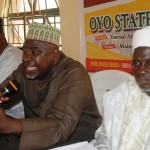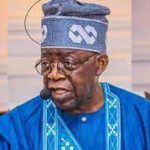Opinion: Modeling Nigeria Future Government and Growth
Featured Contributors/Columnists, Latest Headlines Friday, June 19th, 2015
By Prof R. A. Ipinyomi, University of Ilorin, Nigeria
Although it is still early days to formed a critical assessment on President Buhari and his APC government and it’s major impacts on Nigeria and Africa, it is nevertheless safe to project our expectations and make projections of the future. Many people are very familiar on how Nigeria has got to where a 72 years old, retired army general and former Head of State is back on the seat he lost in a coup to IBB some 30 years ago. President Buhari has himself wished that he has had an earlier opportunity to his present seat but which many critics seem failing to understand. The president may be saying that he wished his administration of 31 December 1983 to August 1984 had not been toppled. He wished he got this seat in 2003 or 2007 or even 2011. We should try to understand him. His limitations are not age numbers (although age determines agility) but the fact that the longer it has taken Nigeria to get rid of the wrong “first eleven players” the more difficult to repair the damages they left behind. Nigeria is a story of serial missed opportunities and a bride that had been raped and molested by several brutal men until an opportunity to marry (in President Buhari’s thinking). Let us hope that President Buhari has positive intentions for Nigeria, and also hope that he believes that he is not the only only who loves Nigeria, or an only reservoir of knowledge on moving the nation ahead. Many of bad leaders always ignored suggestions in the past and leading to their downfall.
With such an open and genuine attitude Nigerians can participate in the development of their on country and their own futures. We can also profer main areas of government transformation, and how progress should be measured in achieving such transformations. From henceforth the three levels of governments (Local, State and Federal) each must promote (a) citizen engagement, (b) administrative efficiency, (c) decision-making process, and must imbibe (d) intergovernment and cross-sector collaboration. In particular the Federal Government of Nigeria (FGN) should organise itself to marshal public and private resources quickly to address challenges. A streamlined government carefully plans workforce reductions coupled with significant organizational, technological and workforce advances. The FGN must take advantage of tech-enabled government in redesigning its policy, legal and regulatory frameworks and processes to align with the dynamics of a networked world. Nigeria should understand it’s position in the World and deliberately plan to met world and Africa’s expectations.
Our quest of a good government will not happen without significant changes in mindset. Part of the new mindset is a call to public and private decision-makers to highlight the most immediate priorities and most promising opportunities to transform governments and enhance their ability to deliver value to citizens at all levels. Central to this strategy is the need for an open and candid dialogue among all entities, organizations and groups potentially affected by the transformation of governments. Offering innovative and pragmatic approaches to what governments can achieve for and with their citizens will remain the ultimate goal. Remaining fast, curious and being on the leading is a priority to be shared with governments that seek to transform themselves for the better, and for all those who want to contribute to this vital ambition. At this stage when the President is yet to unfold his blueprint that will be his road map or his party still embroidered in politicking rather than development what we can critically assessment are the few pronouncements from individual government functionaries.
Recently we overheard that government may introduce token payment of five thousand naira for the unemployed. Whilst we welcome any attempt to palate the hardship of unemployed people, especially graduates and holders of professional certificates, we however think that an approach for them should be two or more dimensional. Whatever is doled out must meet their minimum need, contribute to national economy, encourage job generation and be self sustaining. Therefore an alternative could be a programme to uplift and jump start carers should be more optimal and pursued. The story of Nigeria young graduates are legendary on unemployment. Some 5 or more years graduates remain unemployed while some fresh graduates are self employed because of family support and background. The model that assist some to be independent and self employed immediately must be preferred to one always looking for government job. We are also looking at old age crisis that is a result of either unemployment or lack of pension plan to cover everyone in the society. The citizens must be offered a platform of participation from on start.
A lot has been written on why Nigeria, a richly endowed community, is grappling with just finding daily bread or how to move around. The Buhari’s government is going to think from its published direction as only indiscipline and corruption but we believe it is bad governance, illiteracy, demonic and using people who know nothing about government, or community organisation, or politics. Ineptitude always sees every opportunity as a chance to build his personal ego, castle and self enrichment. Hence the ability to engage only the optimum numbers and the efficient ones can result in effective and efficient government. This may include apolitical individuals but who are focused and discipline to effect an object on ground. This is why we are very worried when we see only “the push for certain candidates” and not the idea of what they could do or needed to be done. APC as a party will be better of if President Buhari could should succeed whereas the party may not stand a test of time if it remains in the old school “fronting for candidates and godfatherism”. The price of democracy will come down with an efficient way of governance. The ruling party’s aspirations henceforth should be service delivery rather than egoism, ability to manage the limited materials and men rather than self accumulation, and so on.
The FGN decision making process, by world standard, has been very poor and on the gambling side. Informed decision based on numerical data is hardly adhered to or practised. Political censuses were conducted only once in a while and very far apart; Several organisations are established with overlapping functions; Our population figures are based only on projections, Multiple policies on same issues are in Nigeria market. Let us take the example of election and the registration. If INEC were to be up and doing the exercise and their activities should be on continous basis engaging people who know about vital statistics and how to survey. Politics should be out and INEC, National Population Commission, National Bureau of Statistics should join hands to produce periodic updates handing voter’s cards to people in their home addresses. The government agents should be ahead of the people in planning and technology, in implementation and forestalling frauds.
The collaborative efforts we expect among the three tiers of government is not just independence but total working on the same page because they are responsible for exactly the same set of people. For example you get to some states and find fairly usable roads whereas the next states have really very bad roads. Some local governments are able to pay ten months salaries others only four months? Please why? It appears to us that the FGN just doles out its monies as it wills without any monitoring or requesting for corresponding parallel responsibility from Local a or State authorities. We demand for intergovernmental collaboration, check and balances.
If Nigeria were to emerge from its present state to becoming a world economy port President Buhari may simply be the first of the connecting chain of leaders but he would do well if he could locate the missing pieces and provide a prevailing atmosphere for integration. It is true that insecurity, corruption, unemployment, indiscipline, lack of transparency and the likes are the motivational forces for this government but these problems even solved are not the end results. We are looking for a society that is very conducive for investment, where everyone is free to participate and practise his beliefs, and a modern society for coming centuries. It is not a country only for the rogues and bandits but also for the saintly and less saintly and where the lions, wolves and the lambs are cohabiting without harming each other.
Nigerians will be able to assess the new government when the administration roles out its officials but the real index is on perceived performance on individual life. For Nigerian elites equal ability to participate in political decision making will be paramount because so far only the money bags have the entire field to themselves and they are extremely biased and self centered. If President Buhari wishes to remain dear in the hearts and lives of average Nigerians his administration should premise on efficient and inclusive government, and politics that commoners can contest in and hope to win. Let the people run the type of government they want but Nigerian media and elites should remain pointers to right destinations. The days of depending on any foreign powers for the wellbeing of our people are over whereas Nigeria soil should be a welcome destination for genuine investors and ordinary visitors looking for a place of refuge.
Prof R. A. Ipinyomi
Related Posts
Short URL: https://www.africanexaminer.com/?p=24078






















